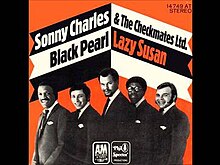
"You Keep Me Hangin' On" is a song written and composed by Holland–Dozier–Holland. It was first recorded in 1966 by American Motown girl group the Supremes, reaching number one on the Billboard Hot 100. American rock band Vanilla Fudge released a cover version in June the following year, which reached number six on the Billboard Hot 100. English singer Kim Wilde covered "You Keep Me Hangin' On" in 1986, reaching number one on the Billboard Hot 100 in June 1987. In the first 32 years of the Billboard Hot 100 rock era, "You Keep Me Hangin' On" became one of the six songs to reach number one by two different musical acts. In 1996, American country singer Reba McEntire's version reached number two on the US Billboard Hot Dance Club Play chart. The BBC ranked the Supremes' original song at number 78 on The Top 100 Digital Motown Chart, which ranks Motown releases by their all-time UK downloads and streams.
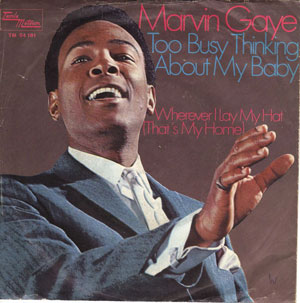
"Too Busy Thinking About My Baby" is a Motown song written by Norman Whitfield, Barrett Strong, and Janie Bradford. The song was first recorded by The Temptations as a track on their 1966 album Gettin' Ready. Eddie Kendricks sings lead on the recording, which was produced by Whitfield. Jimmy Ruffin also recorded a version with The Temptations providing background vocals in 1966. It remained unreleased until 1997.

"You've Lost That Lovin' Feelin'" is a song by Phil Spector, Barry Mann and Cynthia Weil, first recorded in 1964 by the American vocal duo the Righteous Brothers, whose version was also produced by Spector and is cited by some music critics as the ultimate expression and illustration of his Wall of Sound recording technique. The record was a critical and commercial success on its release, reaching number one in early February 1965 in both the United States and the United Kingdom. The single ranked No. 5 in Billboard's year-end Top 100 of 1965 Hot 100 hits – based on combined airplay and sales, and not including three charted weeks in December 1964 – and has entered the UK Top Ten on an unprecedented three occasions.

"River Deep – Mountain High" is a song by Ike & Tina Turner released on Philles Records as the title track to their 1966 studio album. Produced by Phil Spector and written by Spector, Jeff Barry and Ellie Greenwich. Rolling Stone ranked "River Deep – Mountain High" No. 33 on their list of the 500 Greatest Songs of All Time. NME ranked it No. 37 on their list of the 500 Greatest Songs of All Time. The Rock and Roll Hall of Fame added it to the list of the 500 Songs That Shaped Rock and Roll. The song was inducted into the Grammy Hall of Fame in 1999.

"Proud Mary" is a song by American rock band Creedence Clearwater Revival written by John Fogerty. It was released as a single in January 1969 by Fantasy Records and on the band's second studio album, Bayou Country. The song became a major hit in the United States, peaking at No. 2 on the Billboard Hot 100 in March 1969, the first of five singles to peak at No. 2 for the group.
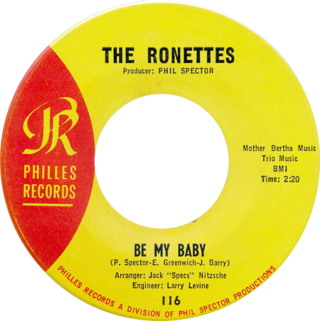
"Be My Baby" is a song by American girl group the Ronettes that was released as a single on Philles Records in August 1963. Written by Jeff Barry, Ellie Greenwich, and Phil Spector, the song was the Ronettes' biggest hit, reaching number 2 in the U.S. and number 4 in the UK. It is often ranked as among the best songs of the 1960s, and it is regarded by some as one of the greatest songs of all time.
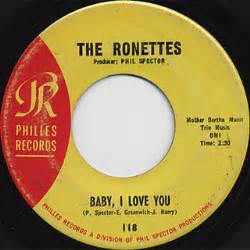
"Baby, I Love You" is a song originally recorded by the Ronettes in 1963 and released on their debut album Presenting the Fabulous Ronettes (1964). The song was written by Jeff Barry, Ellie Greenwich, and Phil Spector, and produced by Spector.
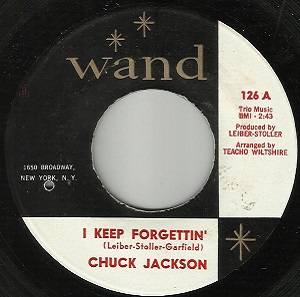
"I Keep Forgettin" is a song by Chuck Jackson, written by Jerry Leiber, Mike Stoller, and Garfield. It appears on his second studio album Any Day Now. It peaked at No. 55 on the Billboard Top 100 and remained on the chart for 7 weeks. It did not chart on the R&B chart. This single is often cited as one of the most innovative yet least commercial singles written and produced by Leiber-Stoller.

"Sea of Love" is a song written by John Philip Baptiste and George Khoury. It was the only top-40 chart-maker for Phillips, who never recorded another hit.

"Remember (Walking in the Sand)", also known as "Remember", is a song written by George "Shadow" Morton. It was originally recorded by the girl group the Shangri-Las, who had a top five hit with it in 1964. A remake by Aerosmith in 1979 was a minor hit. There have been many other versions of the song as well.

"(Your Love Keeps Lifting Me) Higher and Higher" is an R&B song written by Gary Jackson, Raynard Miner, and Carl Smith. It was recorded by Jackie Wilson for his album Higher and Higher (1967), produced by Carl Davis, and became a Top 10 pop and number one R&B hit.
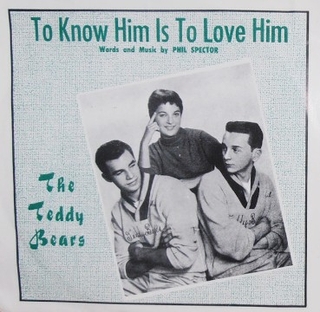
"To Know Him Is to Love Him" is a song written by Phil Spector, inspired by words on his father's tombstone, "To Know Him Was to Love Him." It was first recorded by the only vocal group of which he was a member, the Teddy Bears. Their recording spent three weeks at No. 1 on the Billboard Hot 100 chart in 1958, while reaching No. 2 on the UK's New Musical Express chart. Peter & Gordon and Bobby Vinton later had hits with the song, with its title and lyrics changed to "To Know You Is to Love You". In 1987, the song was resurrected by Dolly Parton, Linda Ronstadt, and Emmylou Harris, whose Trio recording topped the U.S. country singles chart. The song is in 12/8 time.

"Da Doo Ron Ron" is a song written by Jeff Barry, Ellie Greenwich and Phil Spector. It first became a popular top five hit single for the American girl group The Crystals in 1963. American teen idol Shaun Cassidy recorded the song in 1977 and his version hit number one on the Billboard Hot 100 chart. There have also been many other cover versions of this song, including one by the songwriters Jeff Barry and Ellie Greenwich themselves, performing as The Raindrops.

"(You're My) Soul and Inspiration" is a song by American pop duo the Righteous Brothers. It was the group's first hit after leaving their long-time producer Phil Spector. The song was written by Barry Mann and Cynthia Weil, who also wrote the group's first hit "You've Lost That Lovin' Feelin'" along with Phil Spector. It is the title track of their album. The single peaked at No. 1 on the US Billboard Hot 100, and reached No. 15 on the UK Singles Chart. Billboard ranked the record as the No. 3 single for 1966.
The Checkmates, Ltd. were an American R&B group from Fort Wayne, Indiana. The group, discovered by Nancy Wilson, included both black and white members; their one major hit was 1969's "Black Pearl", produced by Phil Spector. The song peaked at No. 13 on the U.S. pop chart. Their remake of "Proud Mary" reached No. 30 on the UK Singles Chart in late 1969.

Sonny Charles is an American soul singer born to a sharecropping family at Blytheville, Arkansas. At the age of 10. he moved with his parents and six sisters to Fort Wayne, Indiana. He was the lead singer of the Checkmates, Ltd. in the 1960s and 1970s, and it is his vocals that are heard out front on their 1969 Phil Spector-produced hit, "Black Pearl". Charles launched a solo career in the early 1970s, and had a brief reunion with the Checkmates during the 1980s. Thereafter, from the mid- to late 1990s, he toured with another member of the Checkmates, Ltd., Marvin "Sweet Louie" Smith, under the Checkmates name.

"Never My Love" is a pop standard written by American siblings Don and Dick Addrisi, and best known from a hit 1967 recording by the Association. The Addrisi Brothers had two Top 40 hits as recording artists, but their biggest success as songwriters was "Never My Love". Recorded by dozens of notable artists in the decades since, in 1999 the music publishing rights organization Broadcast Music, Inc. (BMI) announced it was the second most-played song on radio and television of the 20th century in the U.S.
Horace Faith was a Jamaican reggae singer. He is best known for his cover of the Checkmates, Ltd. song, "Black Pearl", which reached number 13 on the UK Singles Chart in 1970.
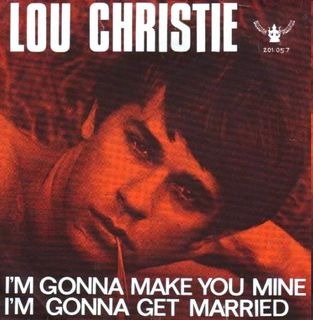
"I'm Gonna Make You Mine" is a song released in 1969 by Lou Christie. It was featured on his 1969 album I'm Gonna Make You Mine, arranged by Stan Vincent and produced by Vincent and Mike Duckman.

Love Is All We Have to Give is the first studio album by Checkmates, Ltd., released in 1969, and their second overall album after the 1967 live album Live! at Caesar's Palace. Love Is All We Have to Give reached No. 178 on the Billboard Top LPs chart.
